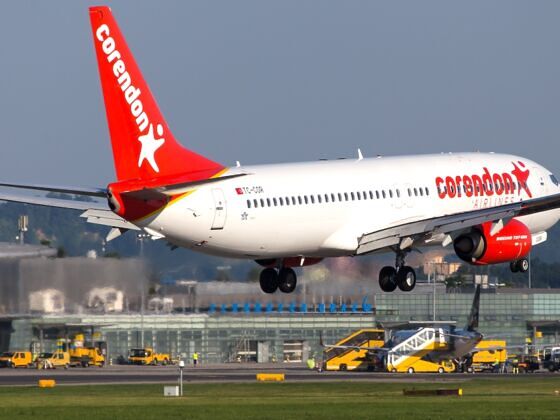Turkish-Dutch airline Corendon recently announced that it will be trialing an adults-only zone on flights between Amsterdam and the Dutch Caribbean island of Curaçao starting on November 3. According to Coredon founder Atilay Uslu, whose company also operates adults-only hotels around the world, the airline is creating a kid-free zone in an effort to “respond to the different needs of our customers” — childless passengers and parents alike.

Will This Airline’s Adults-Only Zone Be as Popular as the Quiet Cars on Trains?
Surveys routinely reveal that crying babies and seat-kicking kids are top torments for fliers. Parents, on the other hand, are stuck agonizing over their children’s in-flight etiquette. Corendon hopes to ease the anxieties of travelers on both sides of the airplane aisle by sectioning off a 102-seat zone toward the front of the aircraft for fliers ages 16 and up using walls and curtains. Nine of the adults-only seats come with extra legroom for those willing to pay a fee of 100 euros ($108) while the other 93 standard seats can be reserved for 45 extra euros ($49) per flight.
According to Coredon’s recent press release, there’s another demographic that might be keen to pony up for adults-only seats, as well: “business travelers who want to work in a quiet environment.”
The concept of low-noise seating is not new to the transportation space. Trains in Europe, Asia, and North America have been using quiet cars for decades. On Amtrak trains, for example, passengers riding in quiet cars are asked to speak quietly and in moderation, refrain from making or taking phone calls, and mute electronic devices or use headphones with sound at a respectable volume to limit ambient noise. Unlike the adults-only zone on Corendon flights, however, the majority of Amtrak’s quiet cars are first-come, first-served and do not cost extra.
Coredon’s messaging around the business-friendly adults-only zone is unclear. Beyond implementing an age limit, it remains to be seen if or how the airline intends to enforce noise restrictions for passengers seeking a “quiet environment” — after all, the same surveys that list crying babies as a primary complaint among fliers also point to adult-inclusive behaviors such as chatty seatmates and inebriated passengers as major annoyances for air travelers.
Coredon is not the first airline to experiment with quiet spaces (although it has set the strictest age limit as an explicitly adults-only zone). In 2013, Malaysian low-cost carrier AirAsia introduced a Quiet Zone for passengers ages 10 and up, while Singaporean low-cost carrier Scott unveiled Scoot-in-Silence cabins for travelers ages 12 and up the same year. IndiGo, a low-cost Indian carrier, unveiled a similar Quiet Zone in 2016.
Other airlines have taken more targeted approaches to address the specific issue of crying babies. Prior to introducing quiet zones, Malaysia Airlines banned infants from its first-class cabins (as well as children under 12 from the upstairs economy section of its superjumbo aircraft). In lieu of quiet zones or bans, Japan Airlines allows travelers to see where children under two will be seated on their flights during the booking process.
Coredon is the first European airline to introduce an adults-only zone, taking a cue not only from some Asian airlines but also many European rail services. But with the additional fees, nebulous distinction between an adults-only zone and a quiet cabin, and the fact that air passengers will never really be as separate as those traveling in different train cars, it’ll be interesting to see how successful the airline’s new initiative actually proves to be come November.